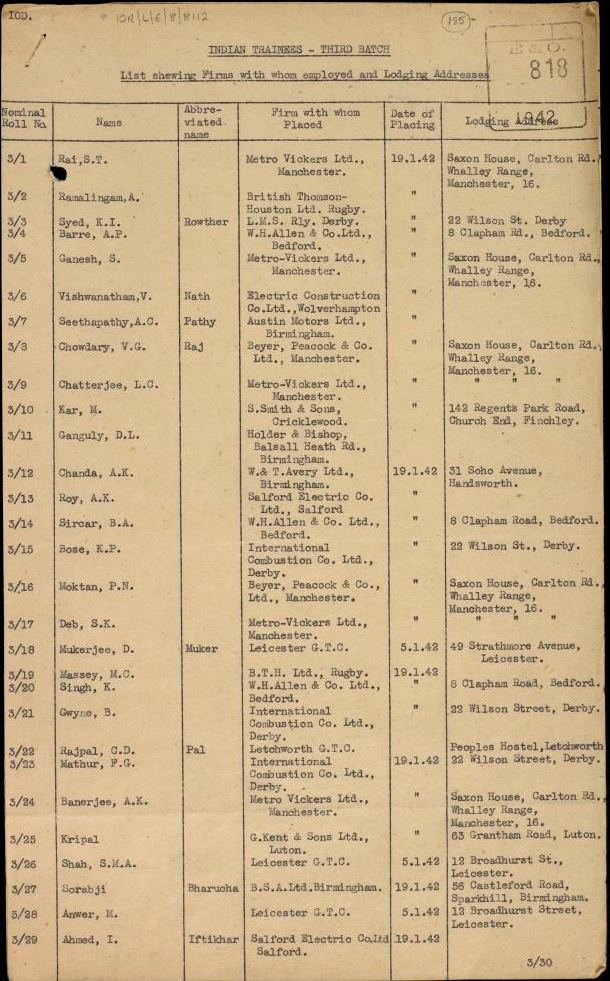
Bevin Trainees
‐
Young Indian men recruited by the Ministry of Labour to take part in the Bevin Training Scheme during the Second World War
Location(s)
Birmingham, Letchworth, London, Manchester, Rugby.
About
In 1941 the Minister of Labour and National Service Ernest Bevin sponsored a training scheme which would address the deficit of trained engineers and technicians in India who were needed to support Second World War-related production, such as munitions manufacturing. The scheme, which was named the Bevin Training Scheme, targeted young, working-class Indian men who may not otherwise have had the opportunity to travel to Britain. These men, known as the Bevin Trainees or Bevin Boys, were recruited in batches between 1941 to 1947, and totalled 900 people. They spent 6–8 months living in cities across Britain.
The Indian High Commissioner covered the costs of travel and funded a welfare officer to accompany the trainees and live with them in Letchworth, where the government training centre was based. R. C. Roy was the first welfare officer to accompany the initial batch of trainees. In a speech delivered by Roy for the Minister of Labour at a welcome event, he emphasized that their work in the factories was part of the collective struggle to secure victory in the Second World War, and that the trainee scheme could lead to a better understanding between India and Britain about their people and customs. This was a message that the Ministry of Labour advocated for.
The trainees spent the first three months of training in Letchworth, before being split across factories to gain first-hand experience in industries such as steel manufacturing, ship building and tools production. Their time in Letchworth, where they lived in hostels and interacted with locals, was documented by the Ministry of Labour for promotional purposes. Upon being dispersed to factories across the country, the trainees were embedded into local families. G. Mustafa Mahmud, for example, who won first prize in an essay-writing competition for the Ministry of Labour’s 1944 pamphlet titled ‘Ambassadors of Goodwill’, reflected on his experiences of living in Warrington, where some aero-engine technicians were sent. He lived with a family and saw this as an opportunity to share what social and intellectual life in India was like, to challenge prevailing stereotypes of India and Indians as ‘wild’. He labelled himself as an ambassador of India and highlighted that his experiences constituted more than technical training, with trade union education and socializing also playing an important role. Similarly, M. G. Kulkarni, who was part of the fifth batch of Bevin Trainees and was sent to Manchester, reflected on his time with the Tuesday Club, a local organization for people from different countries to socialize with one another. Kulkarni also joined the International Club and Christian Comrades, where he discussed politics, issues facing the working classes and trade unionism with people who were similarly supporting the war effort as soldiers or in war factories.
The trainees were dispatched to places such as the Midlands, where Indian activists affiliated with the Indian Workers’ Association and India League were agitating for an independent India. Indian Political Intelligence (IPI) records suggest significant concern among intelligence officers that members of the India League were fostering connections with trainees based at Letchworth. For example, some trainees were invited for lunch at the India League offices in June 1941, where they met members of the organization. Their suspicions of Krishna Menon led to some agents recommending that the training base be moved to a location outside London, and to send trainees to places where there were no India League branches. The IPI reports also suggest that some trainees at Letchworth had grievances about the lack of clothing and food and the infringements on their liberty, as the Ministry of Labour censored the type of information that reached trainees, particularly regarding domestic Indian politics.
By 1946, 86 out of every 100 trainees was in employment, although opportunities for work had declined after the war, when demand for production had reduced. The trainees were given a welfare officer to help facilitate their employment, although there is little indication of how many trainees ended up in work that was related to their technical skillset.
Ernest Bevin
O’Conner, John, ‘Bevin Indian Trainees during the Second World War’, British Library Untold Lives (21 September 2017), https://blogs.bl.uk/untoldlives/2017/09/bevin-indian-trainees-during-the-second-world-war.html
Visram, Rozina, Asians in Britain: 400 Years of History (London: Pluto Press, 2002)
Webster, Wendy, Mixing It: Diversity in World War Two Britain (Oxford: Oxford University Press, 2018)
IOR/L/PJ/12/643, File 1220/41, Indian industrial trainees under the Bevin scheme at Letchworth, Hertfordshire: political influence by Indian activists in UK, India Office Records, Asian and African Studies Reading Room, British Library, St Pancras
L/I/1/978, Indian Workmen Training in Britain, India Office Records, Asian and African Studies Reading Room, British Library, St Pancras
L/PJ/12/643, Indian Industrial Trainees under the Bevin scheme at Letchworth, Hertfordshire, India Office Records, Asian and African Studies Reading Room, British Library, St Pancras
‘English Training for Young Ceylon Mechanics’, Ceylon Daily News (21 August 1946)
DDX 381/15/28, Bevin Scheme Training, Lancashire Archives, Preston
BEVN 5/4, Cardiff, The Papers of Ernest Bevin, Churchill Archives Centre, University of Cambridge, Cambridge
BEVN II 8/2, Papers relating to the Labour Party, The Papers of Ernest Bevin, Churchill Archives Centre, University of Cambridge, Cambridge
BEVN 8/10, Press Cuttings, The Papers of Ernest Bevin, Churchill Archives Centre, University of Cambridge, Cambridge
For image and copyright details, please click "More Information" in the Viewer.

IOR/L/E/8/8112, List of Trainees, 1942, British Library, CC BY-SA 4.0, https://creativecommons.org/licenses/by-sa/4.0/ via BL 'Untold Lives', https://blogs.bl.uk/untoldlives/2017/09/bevin-indian-trainees-during-the-second-world-war.html
Image credit
IOR/L/I/1/978, 'Ambassadors of Goodwill', 1944, British Library, CC BY-SA 4.0, https://creativecommons.org/licenses/by-sa/4.0/ via BL 'Untold Lives', https://blogs.bl.uk/untoldlives/2017/09/bevin-indian-trainees-during-the-second-world-war.html
